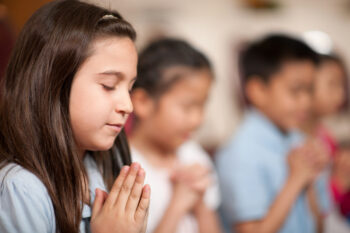 The United Nations Committee on the Rights of the Child has pressed governments across the UK to ‘describe the measures taken to repeal legal provisions for compulsory attendance at collective worship in publicly funded schools and ensure that children can independently exercise the right to withdraw from religious observance at school.’
The United Nations Committee on the Rights of the Child has pressed governments across the UK to ‘describe the measures taken to repeal legal provisions for compulsory attendance at collective worship in publicly funded schools and ensure that children can independently exercise the right to withdraw from religious observance at school.’
Humanists UK, Wales Humanists, and Northern Ireland Humanists all contributed evidence on collective worship to the UN Committee, as well as to the national reports compiled by the children’s rights bodies in each country. Humanists UK has now welcomed the news that the UN is in turn putting pressure on the UK.
The UK is the only sovereign state in the world to impose Christian worship in state schools, including those without a religious character. Parents may withdraw their children from this worship and sixth form pupils in England and Wales may withdraw themselves. However, the process is often difficult and in most schools, no meaningful alternative to worship is offered. This leaves parents to choose between exposing their children to religious indoctrination or isolating them from their peers with little or nothing of educational worth to do. It also needs children who are too young to withdraw themselves forced to attend acts of worship in a religion they may well not believe in.
Humanists UK Education Campaigns Manager Dr Ruth Wareham said:
‘We are delighted that the UN has challenged the UK over compulsory collective worship in schools. Complaints about collective worship are the single largest category of complaint we receive at Humanists UK, with parents and pupils unable to understand why the governments of the UK think it appropriate to impose Christian worship on pupils as a matter of law.
‘Compulsory collective worship threatens the freedom of religion or belief of children and their families and is totally out of step with the kind of inclusive education we should be offering in a diverse 21st-century democracy like the UK. We hope the UN continues to push the UK on this issue and that compulsory worship is ultimately replaced with inclusive assemblies that are suitable for all pupils regardless of background or belief.’
The demand for information on the removal of collective worship laws forms part of the Committee’s list of issues prior to reporting (LOIPR). This is used to shape a review of the UK’s children’s rights record, known as the universal periodic review, which considers how well each country adheres to the UN Convention on the Rights of the Child. The last such review took place in 2016. It recommended that compulsory worship should be scrapped. However, five years on, no progress has been made.
Elsewhere in the LOIPR, the Committee also quizzed the UK on ‘measures taken to… ensure that mandatory sexual and reproductive health education includes material on sexual orientation and gender identity’, as well as what action was being taken to ‘improve wellbeing and address bullying in schools, including against… LGBT children.’ This issue was raised in evidence from Humanists UK, Wales Humanists, and Northern Ireland Humanists, all of which have worked to secure LGBT inclusive, fact-based lessons in relationships and sex education for many years.
Notes:
For further comment or information, please contact Humanists UK Education Campaigns Manager Dr Ruth Wareham via ruth@humanists.uk or phone 020 7324 3000 or 07725 110 860.
Read the list of issues prior to reporting.
Read our latest article on children’s rights experts telling the UK to repeal compulsory collective worship laws.
Read the reports submitted to the UN Committee:
Read more about our work on:
Wales Humanists and Northern Ireland Humanists are parts of Humanists UK. Humanists UK is the national charity working on behalf of non-religious people. Powered by 100,000 members and supporters, we advance free thinking and promote humanism to create a tolerant society where rational thinking and kindness prevail. We provide ceremonies, pastoral care, education, and support services benefitting over a million people every year and our campaigns advance humanist thinking on ethical issues, human rights, and equal treatment for all.
